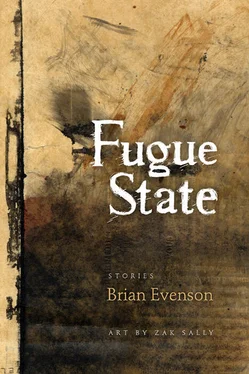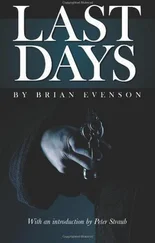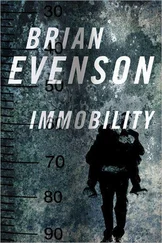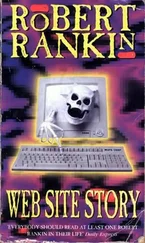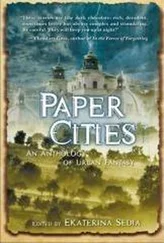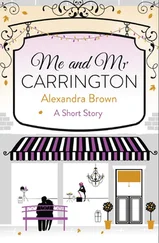This seemed to me sufficient, and I must confess that I did not think about him through the course of my day. There were fences to be attended to, wood to be chopped, brush to be cleared. A corner of the field had become too soggy and I found myself cutting a makeshift drainage channel, thinking up its course as I went. By the end of the day I was mud-spattered, my bones and muscles aching.
And still, as the sun set, I found my thoughts returning to Halber. I could not stop myself from going to see him.
There are strange things that happen that I cannot explain, and this is one of them. He was as I had left him, but still alive. His throat, I saw, had filmed over, the veins not reconnecting exactly but blood moving there, pulsing back and forth within the film in a kind of delicate bag of blood and nascent tissue, pus-like. I watched it beat red, then beat pale, in the gap where his throat had been. At that sight I nearly severed his head from his shoulders, but I was too terrified of what would happen inside of me if I removed his head, and somehow, despite this, he still refused to die.
So instead I went home and sharpened my hatchet.
What can I say about the night that followed, when I chose to become the one who would judge who lived and who died? I have no apologies for what I did, nor any justification, either. I did it simply because I could think of nothing else to do. I am neither proud of my actions nor regretful.
I sharpened the hatchet until it had a fine and impossible edge, and then in the dark I set out. Perhaps if I had met some of the dying and the afflicted, some of those made vicious and deranged by the conflagration, I would have been satisfied. But the only one I met in my path was Halber, and I gave the fellow a wide berth.
What need is there to pursue in detail what followed next? I did unto Rasmus as might be expected. A single blow of the hatchet and I was through his door. I caught him on his way out of bed as he moved down the hall and went after his gun, the hatchet cutting through his back and ribs and puncturing one lung so that it hissed. He went down in a heap, groaning and breathing out a mist of blood, and I severed first one forearm, then the other, and, as his eyes rolled back, lopped off his head. His wife arose screaming from the bed and rushed to the window and tried to hurl herself through. I struck her on the back of the skull with the cronge of the handle, meaning only to silence her screams, but it was clear from the way she fell and the puddle of blood that soon spread from her head that perhaps I had struck too hard. Then I approached Rasmus again and very delicately, with the sharpest part of the blade, peeled off his face.
The other five who had earlier come with him to see me now suffered the same fate, though I killed them more swiftly, with a single blow, and did not disjoint or decorticate them as I had their leader. There is no need to say more than that, I suppose. In the end, I was sodden with blood and gore, and made my way back to my farmhouse, past the still dying Halber, and slept the sleep of the truly dead.
I awoke to the smell of burning, saw when I burst open the door that they had set my fences afire. My fields, too, had been trampled apart, then the ditch redirected and trenches dug to wash away the topsoil. Had my house not been stone, they would have burnt that, too. I stared at the flames a moment and then, not knowing what else to do, went back to bed.
•
It was a week before I could bring myself to leave the house. Finally I stripped off my gory clothing, the blood now gone black, and burnt it in the fireplace. Then I took water from the irrigation canal and washed in it and dressed myself in my town clothes and set off for my neighbor’s farm.
I do not know what I expected. At the very least I expected, I suppose, for Halber to be dead. But he was still alive, still feebly dying in the ditch. I chose not to get close to him.
My neighbor was at his farm, his crops just starting to sprout. When he saw me coming, he rushed inside, came out with his rifle.
“Not another step,” he said.
I stopped. “Do you think your gun can stop me?” I asked him.
“I don’t know,” he said, “but if you come any closer we shall find out.”
“I have no grudge against you,” I said. “I only want those who destroyed my crops.”
“Then you want me,” he said. “You want all of us, the community.”
“But why?”
“Can you possibly ask?”
And I suppose in good conscience I could not, though I thought my neighbor had at least a right to know why I had done what I had done. So I sat on the ground and kept my hand far away from the hatchet and, rifle trained on me, recounted to him, just as I have recounted to you, all that had occurred.
When I was finished, he shook his head. “We have all been through much,” he said, “and you have made us go through more. None of us are perfect men, but you are less perfect than most.”
Then he gestured with his gun. “Come with me,” he said.
He led me back to the road and toward my farm, to the place in the ditch where the dying man was to be found.
“Is this the man you meant?” he asked.
“Yes,” I said. “Halber.”
“But you can see for yourself that he has been long dead,” he said. “And that when he was alive he was not hairless but in fact replete with hair. Please,” he said, “go away and do not come back.”
But I could not see it. Indeed, to me he still appeared as hairless as a baby and, though dying, still alive. I wondered to myself what my neighbor was trying to do to me. Had he not had his gun trained upon me, I would have turned upon him and laid into him with my hatchet. Instead, I simply turned away from him and returned to my house.
•
Where I have been ever since. I do not know if what is wrong is wrong with me or wrong with the world. Perhaps there is a little of both. I find it difficult to face the man dying in the ditch, and it is clear that my neighbors and I no longer live in altogether the same worlds.
It seems strange to think that after all this, after my years of dissolution and then the hard years after the conflagration, I might die here alone, might slowly starve to death. Assuming it is true that I can in fact die.
I will make do as long as I can and then when my straits are indeed dire I shall leave my house and beg mercy from my neighbors. Perhaps they will show mercy, even if only out of fear, or perhaps they will kill me. Either way, it cannot be but a relief.
As for now, though, I shall sit here and write and very slowly starve, waiting part in anticipation and part in fear for the moment when the dying man who so greatly resembles me shall drag himself to his feet and leave his ditch and come again to knock at my door.
This time I shall be ready for him. This time I shall know what to do.
COLOPHON
Fugue State was designed at Coffee House Press, in the historic Grain Belt Brewery’s Bottling House near downtown Minneapolis. The text is set in Garamond.
FUNDER ACKNOWLEDGMENTS
Coffee House Press is an independent nonprofit literary publisher. Our books are made possible through the generous support of grants and gifts from many foundations, corporate giving programs, state and federal support, and through donations from individuals who believe in the transformational power of literature. Coffee House receives major general operating support from the McKnight Foundation, the Bush Foundation, from Target, and from the Minnesota State Arts Board, through an appropriation by the Minnesota State Legislature and from the National Endowment for the Arts. Coffee House also receives support from: three anonymous donors; the Elmer L. and Eleanor J. Andersen Foundation; Bill Berkson; the James L. and Nancy J. Bildner Foundation; the Patrick and Aimee Butler Family Foundation; the Buuck Family Foundation; the law firm of Fredrikson & Byron, PA.; Jennifer Haugh; Anselm Hollo and Jane Dalrymple-Hollo; Jeffrey Hom; Stephen and Isabel Keating; Robert and Margaret Kinney; the Kenneth Koch Literary Estate; Allan & Cinda Kornblum; Seymour Kornblum and Gerry Lauter; the Lenfestey Family Foundation; Ethan J. Litman; Mary McDermid; Rebecca Rand; the law firm of Schwegman, Lundberg, Woessner, PA.; Charles Steffey and Suzannah Martin; John Sjoberg; Jeffrey Sugerman; Stu Wilson and Mel Barker; the Archie D. & Bertha H. Walker Foundation; the Woessner Freeman Family Foundation; the Wood-Rill Foundation; and many other generous individual donors.
Читать дальше
